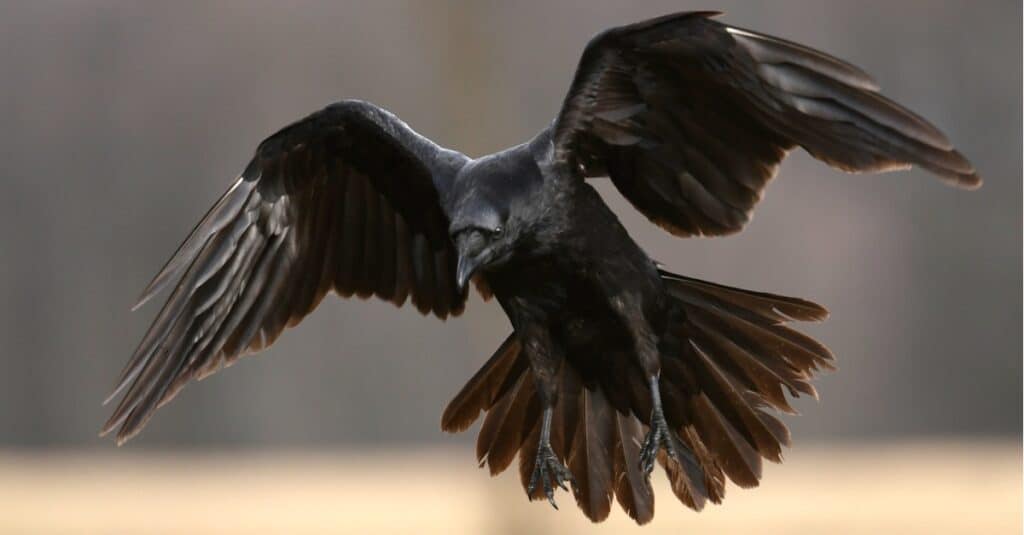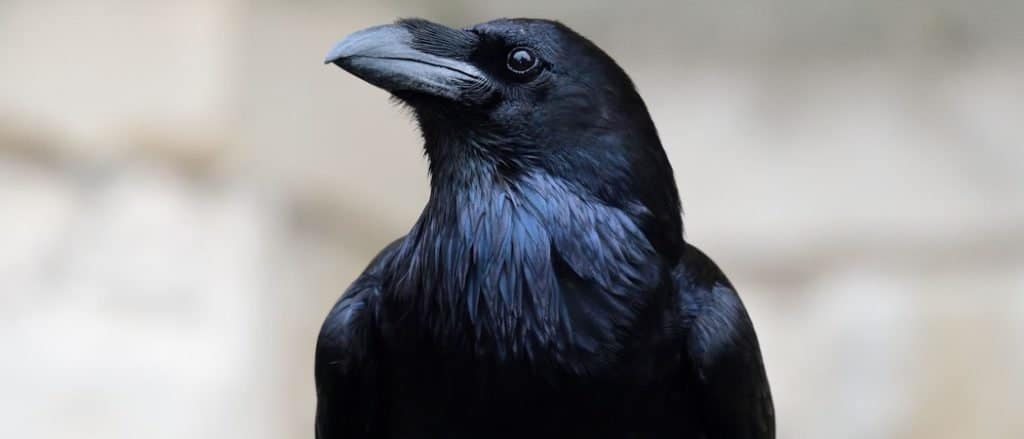You’ve heard them cawing and you’ve seen them soar. Maybe you’ve even befriended one in your yard! But how are ravens and crows as pets? Are there pros or only cons? Let’s find out!
What Are Ravens and Crows?
It is not so easy to tell ravens and crows apart at first glance! But common ravens are bigger than American crows. They are usually seen flying with a partner whereas crows like to gather in larger groups. They are very sociable and are quite scandalous in the way they express themselves.
Ravens have bigger and curvier beaks. At the base, they have bigger bristles (their mustache-looking hairs). Crows are extremely intelligent — they can recognize people’s faces and are even capable of holding grudges, as unbelievable as that sounds! Crows also mourn the death of a member of their flock and participate in funeral rituals. They seem to have found a way to say their final goodbyes.
Why Ravens and Crows Don’t Make Good Pets
According to The Migratory Act of 1916, it is Illegal to keep crows as pets unless you have a special permit. Crows and ravens’ nature is to be out in the wild. They both enjoy and need to be able to fly long distances and look down from high places. The act that was passed is for their protection from (guess who?) humans!

Crows enjoy their freedom with the world as their playground.
©Tiffany Sims/Shutterstock.com
They Need Tons of Space
Crows and ravens always claim their space. They should never be domesticated anywhere in the world as they can become angry if they feel threatened. To confine these birds would be cruel. And remember, crows hold grudges and recognize faces!
They Require Socialization for Their Health
Both ravens and crows need emotional and physical interaction — and not with humans. If they can’t meet these basic social needs, they become hostile. They need each other in their natural environments.
Their Beaks Aren’t Harmless!
Don’t get too close to these birds. They bite! It is very intriguing to watch such amazing birds (and we encourage bird watching!) but you must do so from a safe distance.
They’re Loud
Many would say that they are a bit too loud, and they might be right. But it makes you wonder with their intelligence, what is it they are trying to say? They use different sounds to communicate different messages, making their language more complex than you might have initially thought. Trying to be secretive while illegally keeping these birds is nearly impossible.
They’re Meant to Live in the Wild
Crows and ravens are very creative when it comes to finding their favorite foods such as bits of meat and nuts. They are even capable of using tools like wooden sticks to retrieve food. The way you’re accustomed to a certain lifestyle, so are crows and ravens. To be trapped and kept for the enjoyment of others would destroy their overall well-being, including their mental health.

Ravens, like crows, are one of the few animals that regularly use tools to obtain food.
©iStock.com/Piotr Krzeslak
Ravens and Crows Kept With a Wildlife Captivity License
According to the Migratory Bird Treaty Act, whenever ravens or crows are found destroying agricultural crops, livestock, or wildlife, there is no need for a federal permit to take action. Instead, individual states get to decide whether it is okay to have them taken (killed). In North Carolina, for example, as tempting as it may be, you cannot hold a wild animal as a pet, for enjoyment, or as a companion. In special circumstances, however, a Wildlife Captivity License is allowed to keep a raven or a crow for scientific or exhibition purposes.
Do Ravens Bond With Humans?

A group of ravens is known as an “unkindness”.
©Tom Meaker/Shutterstock.com
Ravens are known for their intelligence, and they also prove to be inquisitive and devoted companions. Despite being termed an “unkindness” when in a group, they are lovable and sociable creatures.
A study published in 2015 in the journal Behavioral Ecology and Sociobiology revealed that crows tend to be more cautious around unfamiliar individuals compared to ravens.
However, they display greater comfort around humans they’ve previously interacted with.
Furthermore, ravens who had prior positive interactions with experimenters were more inclined to engage with them based on their firsthand experiences, and this memory persisted for a minimum of about one month.
Alternatives to Ravens and Crows As Pets
In a nutshell, if you are thinking about a crow or a raven as a pet you must look elsewhere. For instance, you might consider a different type of bird like a parrot or a cockatoo. These birds are fun to have around, and you can own them legally (but check your state’s restrictions). These birds also display intelligence and mimic human voices, which makes for an even more intriguing time.
Keep your love for ravens and crows by further engaging in birdwatching activities. You might even want to make your yard a bit more attractive to them. Fruits, steak, or chicken carcass leftovers, nuts, insects, and worms are yummy treats for these birds. It’s not that you can’t enjoy their presence, you just have to honor their wild nature. Appreciate them from a distance and gain a better understanding of how they behave when allowed the freedom to enjoy their lives to the fullest.
The photo featured at the top of this post is © Krasula/Shutterstock.com
Thank you for reading! Have some feedback for us? Contact the AZ Animals editorial team.







